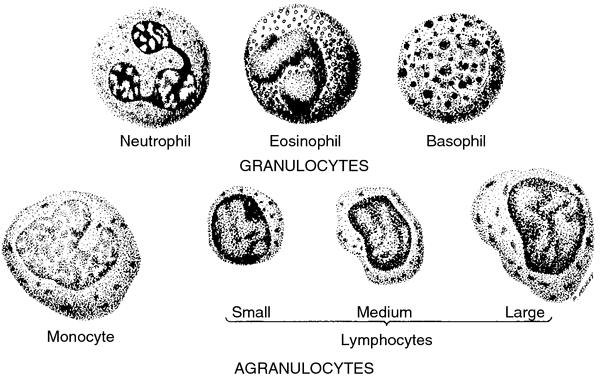Medical term:
leukocyturia
leukocyte
[loo´ko-sīt]a type of blood cell that lacks hemoglobin and is therefore colorless. Leukocytes are larger in size and fewer in number than erythrocytes; normally the blood has about 8000 of them per mm3. In contrast to erythrocytes, leukocytes can move about under their own power with ameboid movement. Their chief functions are to act as scavengers and to help fight infections. Called also white cell or corpuscle and white blood cell or corpuscle. adj., adj leukocyt´ic.
Leukocytes may be classified in two main groups: the granular leukocytes are the basophils, eosinophils, and neutrophils, and the nongranular leukocytes are the lymphocytes and monocytes. About 63 per cent of all leukocytes are neutrophils; 2.5 per cent are eosinophils; and the remaining types constitute less than 1 per cent each.
Leukocytes are actively engaged in the destruction or neutralization of invading microorganisms and are quickly transported to the vicinity of infection or inflammation, so that they can move through the blood vessel wall to reach the site of injury. For this reason, their life span in the blood is usually very short. When infection is present their numbers are greatly increased and they also become more mobile and move back and forth between the blood, lymph, and tissues. The granulocytes and monocytes are phagocytic, swallowing or ingesting the foreign particles with which they come in contact. During the process of phagocytosis the phagocytes themselves are destroyed. The two types of lymphocytes involved in immunity are B lymphocytes (B cells), which play a role in humoral immunity, and T lymphocytes (T cells), which are important in cell-mediated immunity. Plasma cells are activated B cells that secrete antibodies. Monocytes are also involved in some immune processes.
Leukocytes may be classified in two main groups: the granular leukocytes are the basophils, eosinophils, and neutrophils, and the nongranular leukocytes are the lymphocytes and monocytes. About 63 per cent of all leukocytes are neutrophils; 2.5 per cent are eosinophils; and the remaining types constitute less than 1 per cent each.
Leukocytes are actively engaged in the destruction or neutralization of invading microorganisms and are quickly transported to the vicinity of infection or inflammation, so that they can move through the blood vessel wall to reach the site of injury. For this reason, their life span in the blood is usually very short. When infection is present their numbers are greatly increased and they also become more mobile and move back and forth between the blood, lymph, and tissues. The granulocytes and monocytes are phagocytic, swallowing or ingesting the foreign particles with which they come in contact. During the process of phagocytosis the phagocytes themselves are destroyed. The two types of lymphocytes involved in immunity are B lymphocytes (B cells), which play a role in humoral immunity, and T lymphocytes (T cells), which are important in cell-mediated immunity. Plasma cells are activated B cells that secrete antibodies. Monocytes are also involved in some immune processes.

Types of leukocytes.
agranular l's nongranular leukocyte.
basophilic leukocyte basophil (def. 2).
eosinophilic leukocyte eosinophil.
granular l's leukocytes containing abundant granules in the cytoplasm, including neutrophils, eosinophils, and basophils. Called also granulocyte.
neutrophilic leukocyte neutrophil (def. 2).
nongranular l's leukocytes without specific granules in the cytoplasm, including lymphocytes and monocytes. Called also agranular leukocytes.
polymorphonuclear leukocyte any fully developed, segmented granular leukocyte whose nuclei contain multiple lobes joined by filamentous connections, especially a neutrophil.
Miller-Keane Encyclopedia and Dictionary of Medicine, Nursing, and Allied Health, Seventh Edition. © 2003 by Saunders, an imprint of Elsevier, Inc. All rights reserved.
leu·ko·cy·tu·ri·a
(lū'kō-sīt-yū'rē-ă),The presence of leukocytes in urine that is recently voided or collected by means of a catheter.
[leukocyte + G. ouron, urine]
Farlex Partner Medical Dictionary © Farlex 2012
leukocyturia
(lo͞o′kə-sī-to͝or′ē-ə)n.
The presence of white blood cells in the urine.
The American Heritage® Medical Dictionary Copyright © 2007, 2004 by Houghton Mifflin Company. Published by Houghton Mifflin Company. All rights reserved.
leu·ko·cy·tu·ri·a
(lū'kō-sī-tyūr'ē-ă)The presence of leukocytes in urine that has been recently voided or collected by means of a catheter.
[leukocyte + G. ouron, urine]
Medical Dictionary for the Health Professions and Nursing © Farlex 2012
Latest Searches:
Voraxaze - Voranil - Voorhoeve - voodoo - VOO - Vontrol - von - vomitus - vomiturition - vomitory - vomitoria - vomito - vomitive - vomiting - vomit - vomica - vomerovaginalis - vomerovaginal - vomerorostralis - vomerorostral -
- Service manuals - MBI Corp